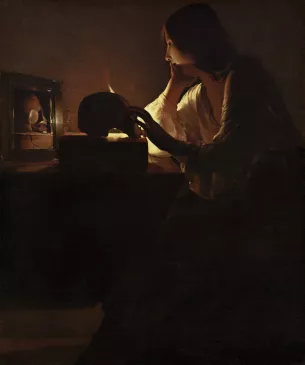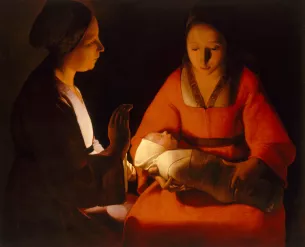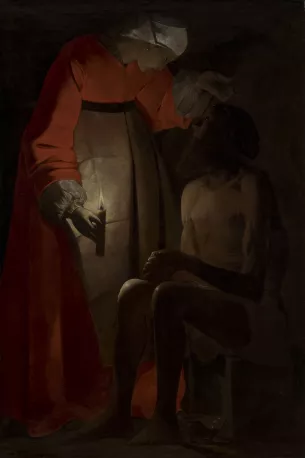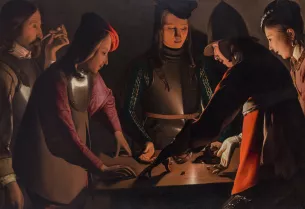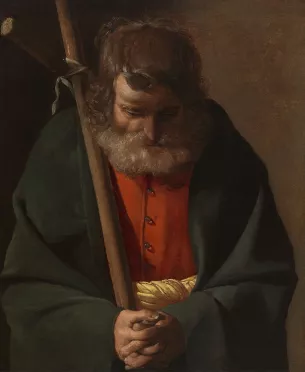ONLINE BOOKING STRONGLY RECOMMENDED.
Due to the high demand for the Georges de La Tour exhibition, we cannot guarantee access for visitors without ticket.
Exhibition
Georges de La Tour
From shadow to light
From September 11, 2025 to January 25, 2026From September 11, 2025, to January 25, 2026, the Jacquemart-André Museum will be honoring the painter Georges de La Tour, known for his intimate scenes and intense chiaroscuro. This is a unique opportunity to view the work of this artist, whose output was limited and rarely exhibited.
Chiaroscuro by Georges de La Tour: a unique use of light
Although there is no evidence of him ever having traveled to Italy, Georges de La Tour was influenced by Caravaggio whose style was then spreading throughout Europe. Inspired by Dutch and Lorraine Caravaggism, he developed a personal and daring interpretation of chiaroscuro that made him truly original. His paintings are notable for their realism and sober compositions, which contrast with the dramatic intensity of Italian Caravaggist works.
Fascinated by the play of artificial light, he produced several night scenes lit by candlelight—including Woman Catching Fleas, Job Mocked by His Wife, and The Dice Players—which have become iconic.
The flickering flame of a candle became a central theme in his works (The Newborn Child, The Penitent Magdalen). By accentuating the density of the materials, the light gives his paintings an intensity that is at once poetic, fragile, and timeless.
Highlighting the ordinary and marginal figures
Although he was interested in scenes of games (The Card Sharp with the Ace of Diamonds, The Dice Players) and genre painting, Georges de La Tour is best known for his religious paintings, which are imbued with remarkable spiritual intensity beneath their apparent simplicity.
By giving a face and dignity to marginalized and popular figures—blind musicians, old people, peasants—the artist elevates the ordinary to the sacred (Woman Catching Fleas, The Newborn Child).
A painter of the people rather than of the court, De La Tour sublimates the solitude of his subjects and transcends the triviality of the world through his remarkable use of light.
Why visit the exhibition?
● A unique event: the first French retrospective devoted to Georges de La Tour since 1997.
● More than 30 masterpieces brought together, out of the artist's forty or so known works.
● The discovery of one of the most enigmatic painters of the Grand Siècle (“Great Century”) and his unique approach to chiaroscuro.
Bringing together rarely exhibited masterpieces, this retrospective devoted to Georges de La Tour is a unique opportunity to discover the talent of an artist whose iconography is both mysterious and fascinating...
With the support of
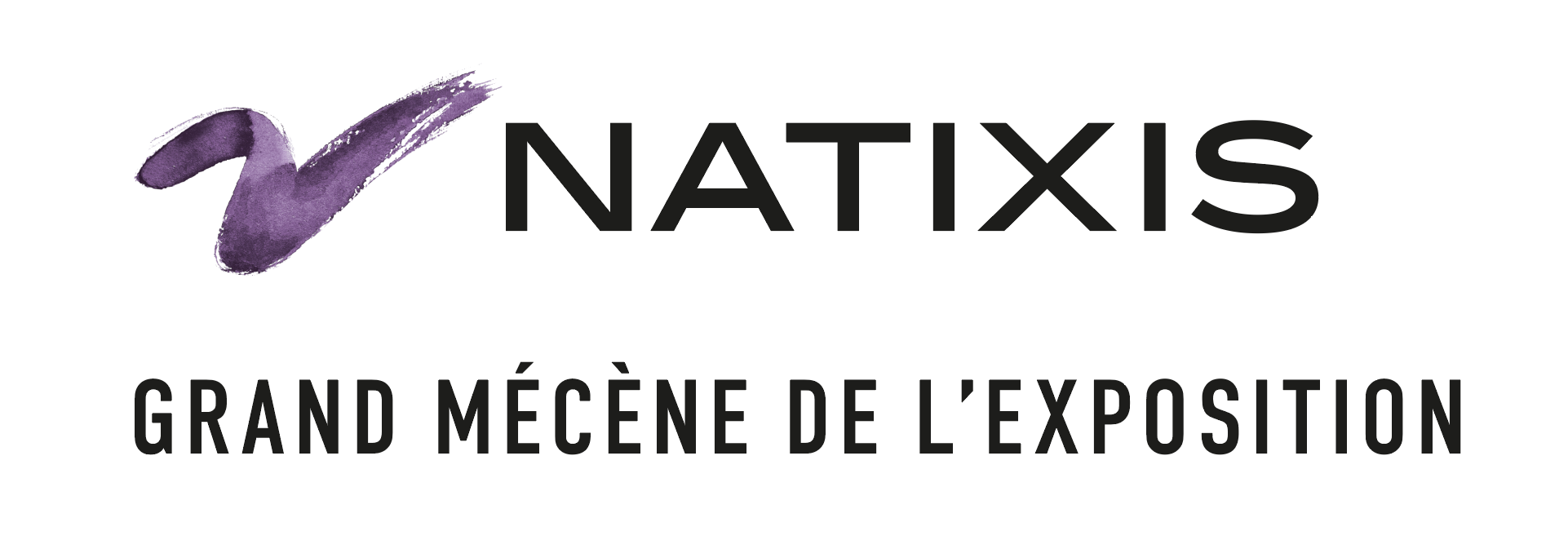
6 key facts about the life and work of Georges de La Tour
● Baptized in March 1593 in Vic-sur-Seille in Lorraine, and born into a family of bakers, Georges de La Tour was the second of seven children.
● In 1638, a fire started by French troops during the Thirty Years' War destroyed his home, his studio, and some of his works. The artist finally found refuge in Nancy with part of his family.
● In 1639, he was appointed “First Painter to the King” by Louis XIII. In this capacity, he lived in the Louvre and was officially recognized by the court and the Parisian artistic community.
● At the height of his career, he painted for prestigious patrons such as Cardinal Richelieu and the Dukes of Lorraine, and became one of the wealthiest notables in Lunéville.
● Few of his paintings are signed and dated—among them Saint Peter Repentant, 1645, The Pipe-blower, 1647, and The Denial of Saint Peter, 1650—which explains why he quickly fell from memory after his death in 1652.
● Rediscovered only in 1915 by German art historian Hermann Voss, he owes his “renaissance” to the study of two paintings kept at the Musée d'Arts de Nantes: Appearance of Angel to St. Joseph and The Denial of Saint Peter.
The team
Curator
Dr. Gail Feigenbaum is a specialist in Italian and French art of the early modern period. Previously Associate Director of the Getty Research Institute, she has worked at the National Gallery of Art, at the Center for Advanced Study in the Visual Arts, where she was Edmond J. Safra Visiting Professor in 2023, and at the New Orleans Museum of Art. She has published numerous works on the Carracci, Caravaggio and Georges de La Tour. She has curated exhibitions such as “Ludovico Carracci” (Kimbell Art Museum and Pinacoteca Nazionale, Bologna), “The Drawings of Annibale Carracci” (Washington DC, National Gallery of Art), “Degas and New Orleans: A French Impressionist in America” (New Orleans Museum of Art), and “Jefferson’s America and Napoleon’s France: An Exhibition for the Lousiana Purchase” (New Orleans Museum of Art). She also collaborated in curating the “Georges de La Tour and His World” exhibition at the National Gallery of Art in Washington DC. At the Getty, she supervised the publication of over 150 books. Recent books include Money in the Air: Art Dealers and the Making of a Transatlantic Art Market 1880-1930; Display of Art in the Roman Palace; Provenance: An Alternate History of Art and Sacred Possessions: Collecting Italian Art.
Pierre Curie is chief curator of the Musée Jacquemart-André. A specialist in 17th-century Italian and Spanish painting, he has also worked with 19th-century French painting at the Musée du Petit Palais, Paris, where he began his career as a curator. He was subsequently put in charge of painting at France’s national General Inventory of Cultural Heritage, and has co-authored and edited “Vocabulaire typologique et technique de la peinture et du dessin” (published in 2009). Appointed head of the painting section of the restoration department at the Centre de Recherche et de Restauration des Musées de France in 2007, he has coordinated and monitored several major restorations of paintings belonging to national museums (Leonardo da Vinci, Titian, Rembrandt, Poussin, etc.). Pierre Curie has been curator of the Musée Jacquemart-André since January 2016 and is co-curator of all its exhibitions.
Production and realization: Culturespaces
Emmanuelle Lussiez, Director of Exhibitions
Milly Passigli, Director of Exhibition Programming
Bernadette Roux, Exhibition Manager
Livia Lérès and Domitille Séchet, for the iconography
Scenography
Hubert le Gall, French sculptor, designer and scenographer

